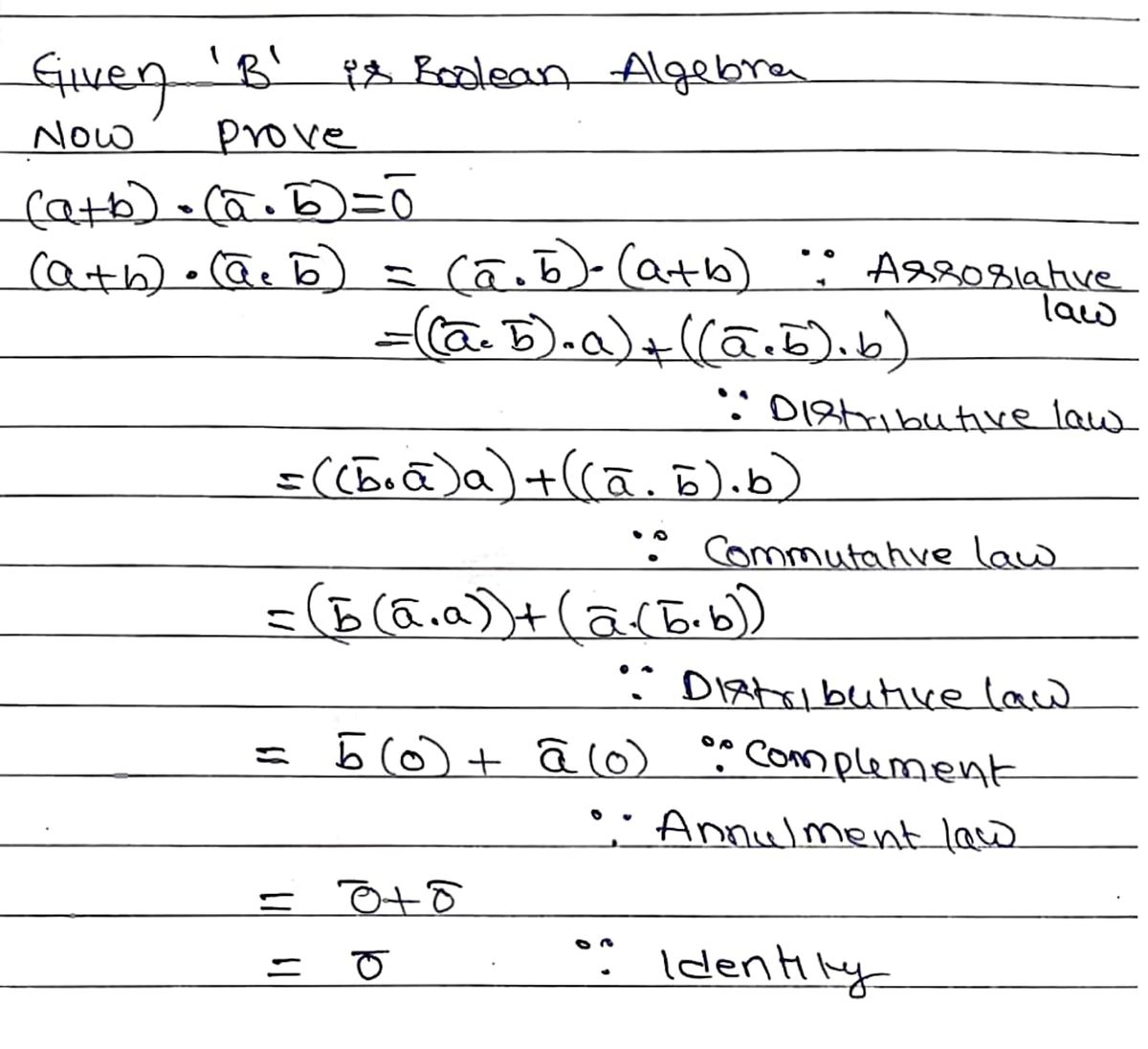Assume that B is a Boolean algebra with operations + and. Prove the following statement. De Morgan's law for +: For all a and b in B, a +b=a.b. Proof: Suppose B is a Boolean algebra and a and b are any elements of B. [We must show that a + b = a.b.] Part 1: Proof that (a + b) (a - b) = 0. (a + b) (ab) = (3.b)(a + b) ((a. b) a) + ((a.5) b) = ((b-ā). a) + ((ā-5). b) = = (b (aa))+((6.b)) = (b. (aa)) + (a (b.5)) = (5.0) + (ā.0) = 0+0 = 0 Part 2: Proof that (a + b) + (ab) = 1. Write a proof for Part 2 as a free response. Be s Choose File no file selected This answer has not been graded yet. --Select-- ---Select-- ---Select--- ---Select-- ---Select-- ---Select--- --Select--- ✓-Select--- by the associative law for by the commutative law for by the complement law for by the distributive law of over + by the identity law of + by the universal bound law for # # # # # + ep. (Submit a file with a maximum size of 1 MB.) Then return to finish Part 3. Part 3: Conclusion. Because both (a + b)(a 5) = 0 and (a + b) + (-5) = 1, it follows from the ---Select--- . that a+b=a.5.
Assume that B is a Boolean algebra with operations + and. Prove the following statement. De Morgan's law for +: For all a and b in B, a +b=a.b. Proof: Suppose B is a Boolean algebra and a and b are any elements of B. [We must show that a + b = a.b.] Part 1: Proof that (a + b) (a - b) = 0. (a + b) (ab) = (3.b)(a + b) ((a. b) a) + ((a.5) b) = ((b-ā). a) + ((ā-5). b) = = (b (aa))+((6.b)) = (b. (aa)) + (a (b.5)) = (5.0) + (ā.0) = 0+0 = 0 Part 2: Proof that (a + b) + (ab) = 1. Write a proof for Part 2 as a free response. Be s Choose File no file selected This answer has not been graded yet. --Select-- ---Select-- ---Select--- ---Select-- ---Select-- ---Select--- --Select--- ✓-Select--- by the associative law for by the commutative law for by the complement law for by the distributive law of over + by the identity law of + by the universal bound law for # # # # # + ep. (Submit a file with a maximum size of 1 MB.) Then return to finish Part 3. Part 3: Conclusion. Because both (a + b)(a 5) = 0 and (a + b) + (-5) = 1, it follows from the ---Select--- . that a+b=a.5.
Calculus: Early Transcendentals
8th Edition
ISBN:9781285741550
Author:James Stewart
Publisher:James Stewart
Chapter1: Functions And Models
Section: Chapter Questions
Problem 1RCC: (a) What is a function? What are its domain and range? (b) What is the graph of a function? (c) How...
Related questions
Question
The final dropdown box is
universal bound laws for + and -
distributive laws
uniqueness of the complement law

Transcribed Image Text:Assume that B is a Boolean algebra with operations + and. Prove the following statement.
De Morgan's law for +: For all a and b in B, a + b = a·b.
.6.1
Proof: Suppose B is a Boolean algebra and a and b are any elements of B. [We must show that a + b =
Part 1: Proof that (a + b) · (ā.b)
= 0.
(a + b). (ā.5)
(ā.b). (a + b)
=
=
(ab) a) + ((a.b). b
•
= ((6.a) a) + ((ab). b)
= (b · (aa)) + (ā· (b. b))
= (b · (a ·ā)) + (ā· (b.5))
(5.0) + (ā.0)
= 0 + 0
= 0
Part 2: Proof that (a + b) + (à · b) = 1.
Write a proof for Part 2 as a free response. Be s
Choose File no file selected
This answer has not been graded yet.
---Select---
---Select---
---Select---
---Select---
---Select---
---Select---
---Select---
---Select---
by the associative law for.
by the commutative law for.
by the complement law for
by the distributive law of over +
by the identity law of +
by the universal bound law for
+
+
+
+
ep. (Submit a file with a maximum size of 1 MB.) Then return to finish Part 3.
Part 3: Conclusion.
Because both (a + b) · (à · 5) = 0 and (a + b) + (ā. b) = 1, it follows from the ---Select---
that a + b = a.b.
Expert Solution
Step 1

Trending now
This is a popular solution!
Step by step
Solved in 2 steps with 2 images

Recommended textbooks for you

Calculus: Early Transcendentals
Calculus
ISBN:
9781285741550
Author:
James Stewart
Publisher:
Cengage Learning

Thomas' Calculus (14th Edition)
Calculus
ISBN:
9780134438986
Author:
Joel R. Hass, Christopher E. Heil, Maurice D. Weir
Publisher:
PEARSON

Calculus: Early Transcendentals (3rd Edition)
Calculus
ISBN:
9780134763644
Author:
William L. Briggs, Lyle Cochran, Bernard Gillett, Eric Schulz
Publisher:
PEARSON

Calculus: Early Transcendentals
Calculus
ISBN:
9781285741550
Author:
James Stewart
Publisher:
Cengage Learning

Thomas' Calculus (14th Edition)
Calculus
ISBN:
9780134438986
Author:
Joel R. Hass, Christopher E. Heil, Maurice D. Weir
Publisher:
PEARSON

Calculus: Early Transcendentals (3rd Edition)
Calculus
ISBN:
9780134763644
Author:
William L. Briggs, Lyle Cochran, Bernard Gillett, Eric Schulz
Publisher:
PEARSON

Calculus: Early Transcendentals
Calculus
ISBN:
9781319050740
Author:
Jon Rogawski, Colin Adams, Robert Franzosa
Publisher:
W. H. Freeman


Calculus: Early Transcendental Functions
Calculus
ISBN:
9781337552516
Author:
Ron Larson, Bruce H. Edwards
Publisher:
Cengage Learning